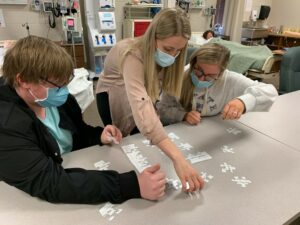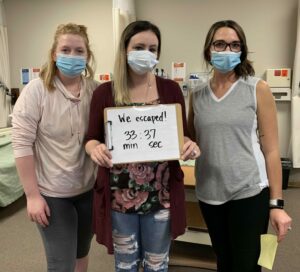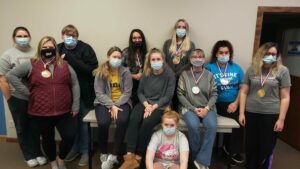By Ashley Steiner
The NCK Tech Practical Nursing Program in Beloit continues to make strides to incorporate th e latest evidence based teaching methods in order to achieve high quality outcomes with their nursing students. The nursing faculty are finding ways to “flip the classroom” to promote further hands-on and application based learning. Samantha Miller, Nursing Instructor, stated, “We are striving to flip the classroom and the lab setting in order to create new and interesting ways to learn the nursing profession!” Last semester, the students were able to participate in their first escape room. Nursing faculty developed the escape room around identifying safety and medication errors. The on campus nursing lab was transformed to resemble individual patient rooms where students in small groups worked together against the clock to identify twenty errors throughout the lab. As errors were correctly identified, the small group of students received a “piece of the puzzle.” The goal was to
e latest evidence based teaching methods in order to achieve high quality outcomes with their nursing students. The nursing faculty are finding ways to “flip the classroom” to promote further hands-on and application based learning. Samantha Miller, Nursing Instructor, stated, “We are striving to flip the classroom and the lab setting in order to create new and interesting ways to learn the nursing profession!” Last semester, the students were able to participate in their first escape room. Nursing faculty developed the escape room around identifying safety and medication errors. The on campus nursing lab was transformed to resemble individual patient rooms where students in small groups worked together against the clock to identify twenty errors throughout the lab. As errors were correctly identified, the small group of students received a “piece of the puzzle.” The goal was to  collect all twenty puzzle pieces, correctly assemble the puzzle and then complete the final task. The final task was written on top of the puzzle and had to be done in the shortest amount of time. “It was a fantastic learning opportunity for our students. The escape room challenged the knowledge and situational awareness of the students, while promoting teamwork and communication in a fun and competitive environment,” stated Sara Arnold, Nursing Instructor.
collect all twenty puzzle pieces, correctly assemble the puzzle and then complete the final task. The final task was written on top of the puzzle and had to be done in the shortest amount of time. “It was a fantastic learning opportunity for our students. The escape room challenged the knowledge and situational awareness of the students, while promoting teamwork and communication in a fun and competitive environment,” stated Sara Arnold, Nursing Instructor.
In addition, the instructors also introduced what they have coined the, “Cardiovascular Showdown,” which divided students into pairs and immersed them into a bracket style challenge of cup pong. The cardiovascular system is one of the most complex and challenging systems to learn. Prior to the showdown, students completed short readings, small assignments/quizzes, and/or short videos daily to begin learning material. Students then participated in a friendly competition of cup pong to quiz their knowledge on introductory cardiovascular material. The top three placing groups were awarded varying levels of extra credit which they could apply to the cardiovascular exam.

